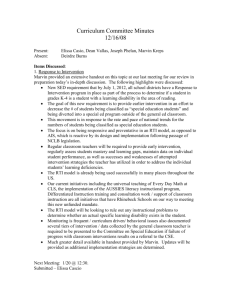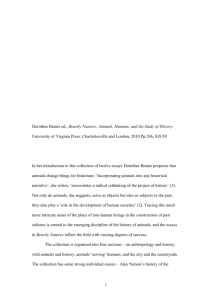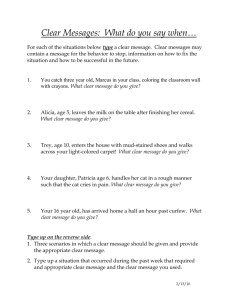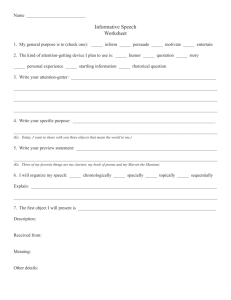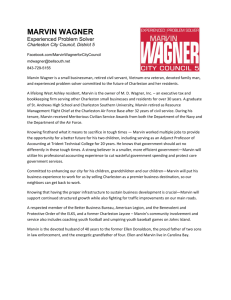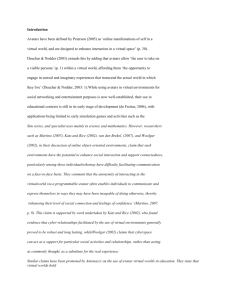Good Enough - Grassroots Writing Research
advertisement
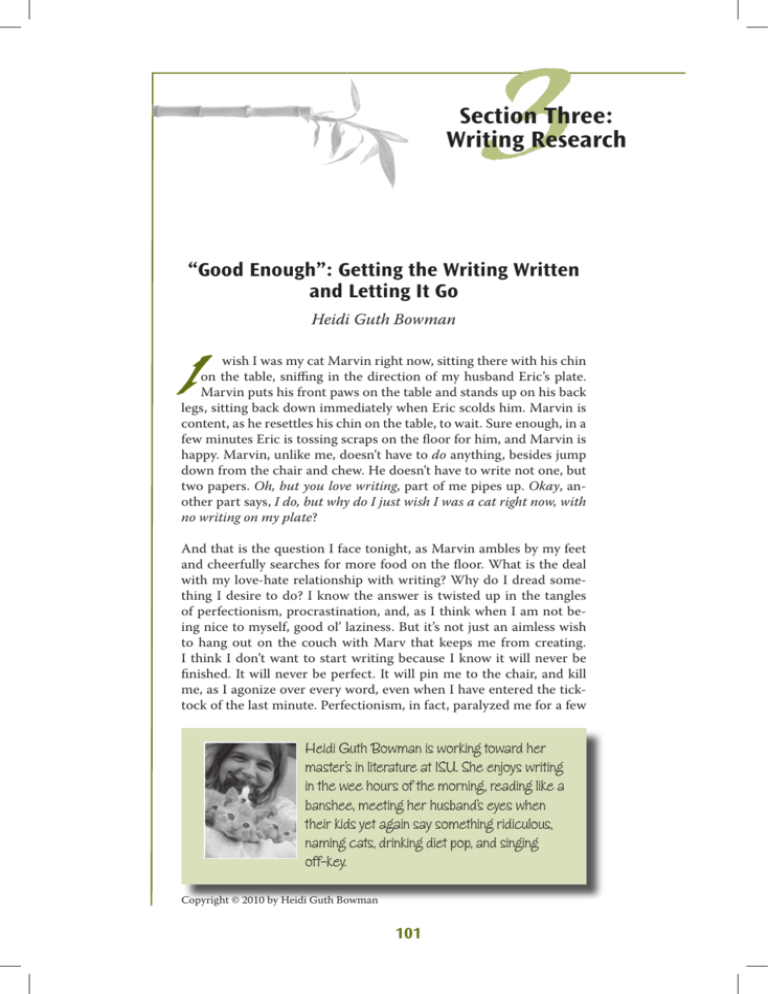
3 Section Three: Writing Research “Good Enough”: Getting the Writing Written and Letting It Go Heidi Guth Bowman I wish I was my cat Marvin right now, sitting there with his chin on the table, sniffing in the direction of my husband Eric’s plate. Marvin puts his front paws on the table and stands up on his back legs, sitting back down immediately when Eric scolds him. Marvin is content, as he resettles his chin on the table, to wait. Sure enough, in a few minutes Eric is tossing scraps on the floor for him, and Marvin is happy. Marvin, unlike me, doesn’t have to do anything, besides jump down from the chair and chew. He doesn’t have to write not one, but two papers. Oh, but you love writing, part of me pipes up. Okay, another part says, I do, but why do I just wish I was a cat right now, with no writing on my plate? And that is the question I face tonight, as Marvin ambles by my feet and cheerfully searches for more food on the floor. What is the deal with my love-hate relationship with writing? Why do I dread something I desire to do? I know the answer is twisted up in the tangles of perfectionism, procrastination, and, as I think when I am not being nice to myself, good ol’ laziness. But it’s not just an aimless wish to hang out on the couch with Marv that keeps me from creating. I think I don’t want to start writing because I know it will never be finished. It will never be perfect. It will pin me to the chair, and kill me, as I agonize over every word, even when I have entered the ticktock of the last minute. Perfectionism, in fact, paralyzed me for a few Heidi Guth Bowman is working toward her master’s in literature at ISU. She enjoys writing in the wee hours of the morning, reading like a banshee, meeting her husband’s eyes when their kids yet again say something ridiculous, naming cats, drinking diet pop, and singing off-key. Copyright © 2010 by Heidi Guth Bowman 101 Writing Research moments in the paragraph above this one. I have re-worded and reworked my descriptions of Marvin (who couldn’t care less which words I choose to portray him and his endless appetite) several times, and I am still bothered by my three uses of the phrase “on the table.” But, being the procrastinator I am, I have continually delayed this writing, and I don’t have time to continue wondering if there is a suitable noun that could replace “table.” I want to try to turn this writing into “written.” I want to try to get this job done. Some things that I never wrote haunt me to this day. I write beautifully in my head, while I am scooping the cat litter or driving to the library, but I wait around and wait around to start the actual writing, whether it is for a class assignment or a letter to an old friend. I put so much performance pressure on myself that the on-paper writing, which is never perfect, sometimes has never happened. I’m in my thirties, and I still regret that I never took the time to write my high school graduation thank you cards, because the prospect of writing them in the perfect voice, the voice of the grateful, excited teenager on the verge of college, just seemed like too much to handle. Worse yet are the timely letters to the editor of the local paper that I have let burn to ash inside me. Rather than risk saying something imperfectly, I chose to say nothing at all. What a bunch of crap. I have learned, as I try to write in this little house full of living distractions, both feline and human, that if I want to be a writer, I had better start writing, or else my words of gratitude, my words of rage, my words of reflection, will just never get said. Knowing I need to start the writing and doing it are two different things, however. This article, for example, has been following me for several weeks. I know it’s there, hiding behind a corner, while I dump out and organize drawers that have been cluttered for months and ponder which colors to paint the house that has needed painted for years. I know I am avoiding the writing, as I am afraid to throw my energy into it. But now that I am here, actually in the writing moment, it’s not so bad. I don’t even want to be a cat at the moment. I can’t escape and I don’t want to escape, as I know if I do wriggle free of my writing responsibilities, the freedom won’t be worth the guilt of my unwritten words. It’s a matter of getting to the writing, of turning to the article behind the door, and saying, quite warmly, “Oh, come in already. I know you’re not going away. My family has been asleep for hours, but here, come and sit with me and a few of my cats. This is Marvin. This is Sugar. This is George. Yes, come in, article, and let’s get comfortable. Let’s get cracking.” Some of the best advice I have gotten on “getting cracking” on my writing came from Anne Lamott’s book Bird by Bird: Some Instructions on Writing and Life. She tells us to allow ourselves the freedom of a “shitty first draft.” She says it’s okay to throw some things out on paper, make a mess, and clean it up later. Sometimes I feel like my writing is just layer upon layer of shitty first drafts, but somehow, once the words are out, they seem to find a way to come together, eventually, in a semi-cohesive 102 Bowman / “Good Enough”: Getting the Writing Written and Letting It Go final piece. The shitty first draft idea has liberated me, to face the writing, get started and get moving. The time I hauled my lawn chair and laptop into the cat yard remains one of my favorite writing memories. The sun hammered down on me while I typed away about the animals within a Kundera novel, surrounded by animals of my own. I usually compose on a laptop, but once I decided to scribble out some of my research paper in a spiral notebook while I was sitting and waiting at the eye doctor’s. I later ripped out my scrawled pages and typed some of them into the draft on the computer. I often feel my writing is like weaving. I piece together a scrap of an idea here, or sew in a sentence there. Lamott says to take things “bird by bird,” or step by step, or even, for us feline aficionados, cat by cat. I am not going to get my whole research paper finished today. Maybe I can write about one point. Maybe I can expand on one quotation. Maybe I can play with one idea. It’s a process, and it’s actually pretty fun. In my Introduction to Graduate Studies class, I got more good advice from my professor and my peers when I openly discussed (or possibly even just whined) about my problems with writing papers. “Will it ever change? Will it always be a mad dash to the finish? Does it ever get better?” I wanted to get better. I was sick of racing breathlessly across the quad, hoping the instructor didn’t really mean it when she said you could not drop it off even two minutes after the scheduled time. My professor and classmates were encouraging. They told me to set small goals for myself. They told me to try different methods, like timed writing. They also told me to give up the perfectionism, or nit-picking, as the professor called it. “Who needs perfect,” she said, “when you’ve got damn good?” My mind instantly rang with my boss at work’s frequent expression: “Good enough!” I used to wonder if his chirpy “Good enough!”’s were just an invitation to let us off the hook, to let us be sloppy and do substandard work. But no. He says “Good enough!” because, most of the time, it is good enough and it’s time to let it go. In the same class, we studied Mark Twain’s Adventures of Huckleberry Finn. This novel is generally considered an American classic, a timeless tale of a boy who has to learn to listen to his own heart when it comes to morality. I was surprised to realize that this book is not perfect. It’s pretty clear that at the end of the book Twain just wasn’t sure what to do with Tom Sawyer. But he kept writing. He kept writing, and we have a wonderful, messed-up book. It isn’t perfect. Writing never will be. But it’s a classic! And he’s Mark Twain! If Mark Twain wasn’t perfect, why should I expect to be? If I am going to finish the writing, I have to start it. I realize I will never finish it, not completely, as writing is always a forward motion, a work in progress. I will always want to re-write sentences and change things around. But I have learned to let things go. And sometimes, while I am doing it, the world will toss me a scrap and I will realize, quite cheerfully, that there is really nowhere else I’d like to be. 103 Writing Research As for Marvin, I swear on Mark Twain that he is, at this moment, on my lap, purring, pushing his paws into my legs while I type. Good enough.* *My cat Macaroni would like to add that he is the cat on my lap for my final draft, as we all know the original draft is long buried under revisions and rearrangements. Marvin has been too busy bug-hunting in the living room to be of any moral support for me tonight. Mac, however, has been very encouraging for this writing go-round, purring peacefully on my lap and occasionally looking up to bite me, somewhat gently, on the nose. 104
